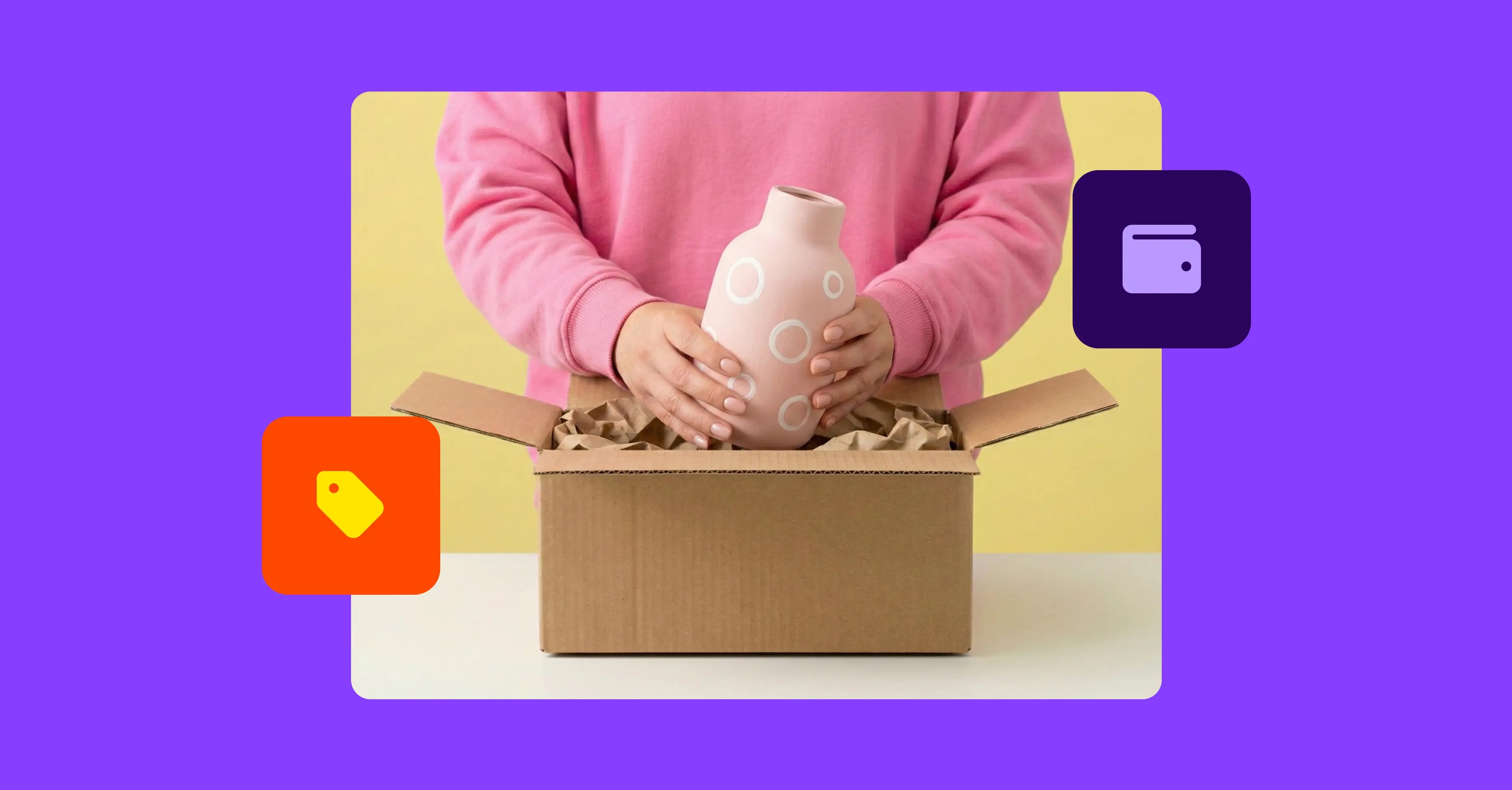You have a business idea. Perhaps you’ve already begun developing it, or have even started the online business already but feel like you’re missing some underlying principles. Wherever you are in the process, it’s important to understand that at the foundation of every business is a business model. You need to know what model your ecommerce business is built upon.
Why? Because running a business involves more than just selling products or services or building ecommerce websites. Before you get to that point, you need to know the kind of business you intend to build in the ecommerce market.
Each type of ecommerce business model requires a different set of processes, systems, skills, and resources. Study the different models in this article and build your ecommerce business in the smartest and most effective way.
What is an ecommerce business model?
↑ Back to topA business model describes how your business is structured in terms of your products, services, and the customers you serve. What do you sell, and how do you sell it? And to be clear, you can use more than one model for the same business. Lots of companies do.
An ecommerce model is any model that can work well within the ecommerce industry, meaning you are a business selling products or services online. As you’ll see, you can use just about any model to build an ecommerce company.
To determine which ecommerce models describe the type of business you have in mind, these are some of the core components to think about:
Value proposition
What problem do your products and services solve? How do they solve this problem in ways that are unique to your business?
For example, some people want cars that produce less pollution. But in the early days, most electric vehicles took too long to charge, had poor acceleration, and were difficult to charge away from home. Tesla solved these problems by creating its own charging network, nice looking and high-performing cars, and lower charge times.
They saw a problem and found a way to solve it.
Now, if you sell a lot of products, you may have more than one value proposition. But your overall business also has a value proposition. What is your company about? What is your mission? What can customers expect when they interact with your ecommerce company, that they won’t get anywhere else?
Pricing strategy
Whatever problem you’re solving, how much is the solution worth to your customers? Are you going for the luxury market, bargain shoppers, or somewhere in the middle? Are you going to charge flat prices, offer payment plans, use subscriptions or memberships, or something else?
How many other online stores sell similar products or services, and what do they charge? Are you serving the same markets or a higher-valued niche? Can you justify higher prices that your customers will happily pay because you deliver a better customer experience, have higher quality products, or have some other tangible competitive advantage?
Target audience
Who are you targeting? If your products solve problems faced by certain types of businesses, then businesses in particular industries are who you’re targeting, and that will affect the prices you charge. Your target market is whoever has the problem you’re solving.
And again, you may have more than one group of targeted customers, and more than one ecommerce business model. But you need to understand who you’re selling to so you can build your business strategy on the proper foundation.
Delivery model
How will you deliver your products or services? You can do this in person, all online, with shipping, using a combination of retail and shipping, with dropshipping, and various other methods. You must know how to best deliver whatever you’re selling.
Products or services
Your business can sell services, products, or both. The types of products and services you offer determine the type of model you’ll be using.
For example, suppose you want to teach online courses about gardening. You can deliver this content in written form with a physical mailing that includes a notebook along with digital files. You can deliver it via an online course platform. You can also deliver it in person at live events. Or you can do all three or various combinations.
And you might price this per course, as a bundle of courses, or with a subscription.
You could also supplement your online courses with group or individual coaching. And, you might decide to sell actual products on behalf of various garden suppliers. But you could also sell your own products as a private label created specifically for your business.
There often is no “right” business model, but hopefully you’re beginning to see how the model you choose will affect the way your ecommerce business takes shape.
Why choosing an ecommerce business model matters
↑ Back to topIn any business or organization, you’ll tend to find two kinds of people in leadership positions — visionaries and achievers. Visionaries have great ideas, but aren’t as focused on implementing them. Achievers aren’t always great at coming up with ideas, but they excel at getting things done, and done right.
Your model matters because it helps capitalize on the strengths of both types of people.
The ecommerce model you use will keep a visionary leader in check. That person might keep coming up with big ideas, and some of them might be good. But if they veer too far from your model, you can just park those ideas and return to them later.
The model also helps the achiever stay focused on the goal and the mission they’re working toward. It provides the framework on which to build everything else.
For example, if you’re a business to business (B2B) company, and someone tells you at a networking event about a great opportunity to bid on a government contract, the visionary might jump at the chance. But the achiever can remind them that your company is not a business to government (B2G) company, and working with government agencies is a completely different process than working with other businesses.
Again, it’s not to say you can’t do both. But you can’t just jump into the B2G model on a whim because someone thought it was a good idea. Here are more reasons why choosing ecommerce business models is important:

It appeals to investors
If you’re planning to raise some capital from potential investors in your business, they will want to know what model you’re using. It helps clarify in their minds what you actually do, how your business works, and what they’re really investing in.
Likewise, if you want to work with any business partners or form agreements with other online retailers and businesses in a joint venture situation, they too need to know how your business is structured and what business strategy you’re using. They need to know who they’re doing business with. They need to know more than, “We sell pet food.”
It helps narrow down your search for business assets
Knowing your ecommerce model also helps you zero in on the various tools and assets that will help your business operate and grow.
What types of vendors and suppliers will you work with? What software will you need? What internal operations systems and processes will be necessary? Your model affects your answers to these kinds of questions.
A dropshipping company, for example, will need to find suppliers who sell the types of products they want to sell, and a software platform that can sync with their suppliers.
It directs your marketing
Marketing to consumers is different from marketing to businesses. Marketing to retired consumers is different from marketing to consumers just starting their professional careers. Your business model affects your target audience. And that audience impacts your marketing strategy.
But it goes further than that. Marketing a subscription service looks different than marketing used goods, which looks different than marketing services performed in person. The systems and processes — like ecommerce content marketing, social media marketing, paid ads, etc. — required to sell and market using these approaches will be different in each case.
So the ecommerce business model you choose will affect how you do marketing.
It enables you to pivot
Market conditions change. This affects some types of businesses more than others.
For example, if your business depends on a particular type of software, what happens if that software gets updated, altered, or eliminated? What if the software company goes out of business or changes their direction?
Now, you have to change yours. Your model will point you in the direction of how to change and adapt to situations like this.
Consumer preferences and habits change. New technology emerges. Economic realities affect commerce, sometimes permanently. Other online stores emerge and the competitive landscape changes.
Ecommerce business models help keep you on track and enable you to pivot in response to changing external forces.
And in some cases, you may recognize that you need to change your model to adapt to external changes outside your control. And that’s fine if you have to do it. But it’s the recognition that you’re making changes to the core of your business that matters here.
“We’re no longer just a B2B business. We’re now also a B2C business, and here’s why.” Those are the kinds of statements you’ll make when you explain what changes are about to happen.
It helps you know what to ignore
A well-defined model keeps you from chasing after wild geese and shiny objects.
There’s no end to the pitches you’ll get from marketers telling you what your business needs. Your ecommerce model helps you evaluate which ones apply to you, and which ones have no relevance and can be quickly ignored.
You’ll also hear from friends and colleagues about some great new tool or service that helped their business, and you should use it too! Well, maybe not. Their model isn’t the same as yours. So you can just nod and say, “I’m glad that’s working well for you.”
How to choose an ecommerce business model
↑ Back to topOnce you know the types of business models you can choose from, just follow this three-step process, and you’ll have the right fit.
1. Evaluate your idea
First, take a look at your business idea, your products and services, your value proposition, and your intended audience. What are you planning to sell, who is it for, and what gives you a competitive advantage?
2. Write a business plan
Next, write a business plan. This helps focus and clarify what you’re going to do, how you’ll do it, the assets and personnel required to make it happen, your initial marketing plan, the customer experience you will deliver, and projections for revenue and expenses. Will you have an online store, retail stores, a hybrid, or something else?
Writing the plan will help you answer important questions before you actually begin to work on the business, product, or service. And in this process, you’ll be forced to consider various types of ecommerce business models.
3. Find the business model that works best
As you’re writing your plan, you’ll come to articles like this one and consider the types of ecommerce business models that make the most sense for you. Pick whichever ones you want to build your business on first, and you’ll be ready to go.
Types of ecommerce business models
↑ Back to topSo, with all that in mind, let’s take a look at some common ecommerce models. The first five models in this list are the most broad, and pretty much every business falls into one of them. Beyond that, you’ll find some specialized business models that may help you more accurately define and describe the type of company you’re building.

Business to consumer (B2C)
When the typical person thinks of a business, they most often think of a business to consumer model. This is the most common ecommerce model.
A B2C business serves consumers. Shoppers. All types of people, or some segment of the general population. If you’re selling to or serving individual people, you probably have a business to consumer model — whether you’re selling clothing, food, home repair services, yard maintenance, software, or anything else.
You may be selling to wealthy people, retirees, families, homeowners, renters, people with kids, people without kids, vacationers, car owners, non-car owners, young people, recent graduates, newlyweds, or many other demographics. Or, for businesses with a broader customer base, you could be selling online to just about everyone.
Some B2C businesses operate entirely online. Others sell through retail brick and mortar stores. And others use a hybrid model that sells in person and online.

Business to business (B2B)
The B2B model looks very different from the B2C one. Here, you’re not selling to individual people. You’re selling to other businesses. For any business to operate, they have to also buy products.
Think of something like a dentist. The dentist uses a business to consumer model, and is a service-based business. But the dentist has to buy all sorts of products to keep their clinic running. They have to buy cleaning supplies, dental equipment, x-ray films and machines, floss and toothbrushes, splash guards, mirrors, specialized lighting, and many other products and types of equipment.
All that stuff gets sold to them by other businesses using the business to business approach.
In fact, most dentists also have websites and do some sort of marketing. The companies managing their websites, their search engine optimization (SEO), print marketing, email marketing, PPC, social media, and whatever other marketing they may be doing are, for the most part, using the business to business model.
Woo is a B2B business, offering an ecommerce platform tool that companies can use to sell products and services using a variety of extensions, digital assets, and marketing education.
Just like B2C businesses, B2B businesses also tend to have particular target markets. They typically sell products to certain types of businesses. This could be small businesses, corporations, retail businesses, or local businesses. This could also be by sector, such as automotive businesses, roofing companies, restaurants, software businesses, marketing companies, hospitals, insurance companies, and any other industry you can think of.

Consumer to business (C2B)
The C2B model isn’t as commonly discussed, but due to the internet, there are more and more businesses using this model than ever before.
With consumer to business, you have an individual selling services to a business. In some ways, this can look like a B2B business, and you’re marketing to businesses if you use the C2B model. But since these tend to be mostly lone service providers, they don’t look like traditional businesses. They’re more commonly thought of as contractors.
Their business clients might pay a fee for service. Or, they might pay hourly but on a contract basis. It’s common for a C2B business to have their own service contract that may or may not get customized for each business they work with.
Here are a few well-known types of consumer to business companies:
Influencers
Social media influencers offer the service of publicity to businesses who want to make their brand more well known. The influencer pitches a product or service from that company, or just touts the brand itself, to their followers who tend to respect and appreciate their opinion and perspectives.
The business will often send a product to the influencer, who will then use it and talk about it to their followers. They may even create videos showing themselves using the product.
However the details play out, this is an individual offering their ability to publicize a product to businesses who align well with the demographics of the influencer’s followers.
Freelancers
Due to businesses such as Upwork, a whole host of freelancers has arisen in recent years. You can go online to find graphic designers, copywriters, developers, consultants, book cover artists, translators, and many other freelancers who offer services that are useful to businesses.
Photographers
Photographers and graphic designers can use websites like Shutterstock and Pixabay to sell their photos and visual creations. These are individuals selling assets that are useful to businesses for marketing purposes.

Consumer to consumer (C2C)
The consumer to consumer model is a bit more difficult to make work on a sustained basis where this is your only source of income, but some have figured out how to do it.
This often looks like resellers using an online marketplace such as Amazon, eBay, Etsy, or even Facebook marketplace The seller procures used or barely-used items and sells them through these types of outlets.
Sometimes, they hand-craft their own products and sell them individually on these same online marketplaces, which function for them as their ecommerce website.
If you have access to a steady stream of products you can sell through online marketplaces, you can create a viable income stream using the C2C model.
But again, this is a difficult model to scale, and tends to work better as just one of several income channels.
If this model is interesting to you, consider making WooCommerce your home and utilizing proven extensions to also sell on other platforms for maximum exposure and efficiency.

Business to government (B2G)
The last of the five most broad types of ecommerce business models is the B2G model. This model gets its own category because working with government agencies is very different from working with businesses or consumers.
In some cases this can feel like the B2B model if the government just calls you up and asks to purchase your products or services. For something like an office party caterer, serving a government office probably won’t look that different from serving any other business or consumer.
But typically, when businesses work with the government they have to bid for the job. You may have to formally respond to a request for proposal (RFP) and jump through a variety of hoops to win the job. The process tends to move slower because things have to get approved and vetted in ways that don’t matter to regular businesses. Government contracts are just a different animal.
And, with the business to government model, it’s harder to scale up. Winning a job with one or a handful of government agencies doesn’t necessarily mean you’ll have an easier time getting a deal with another department. There are exceptions to this, but in general, it’s a difficult model to pursue if your goal is to steadily increase your ecommerce sales.
A note about common business models
It’s worth a pause here to make a few things clear that you may already be wondering.
Yes — the same business can utilize more than one model. For example, you may have a thriving B2B business, and then you hear about an opportunity to win a government contract. So, you pursue it, learn a lot, respond to an RFP for that government agency, and maybe get the job. Congratulations — you’re now using the B2G model. But that’s just expanding on your main business, not altering it.
Many businesses serve both consumers and businesses. And as you begin looking at the remaining types of ecommerce business models on this list, you’ll notice that several of these can be executed using one or more of the five broad business models already discussed. The next ones are just more specialized.
So, let’s look at some different ecommerce business models.

Direct to consumer
One of the most appealing models for many ecommerce businesses is the direct to consumer (DTC) model. This is a form of a B2C business, and many ecommerce companies are using it.
The main distinction is that the direct to consumer business sells directly to the consumer without using a third-party supplier, retail store, or other online store. In other words, you make your products, and then you sell directly to your customers.
With DTC, you get to set your own pricing, create your own specials, do your own marketing — you run the show for your products, because you own everything.

Subscription
A subscription model offers customers some sort of recurring payment option. It could be monthly, annually, or some other chosen timeframe. In theory, just about any company could add subscription services to their existing model.
The reason this deserves its own category is because when you run a subscription model, you must then begin working on the primary goal associated with this model — keeping your subscribers happy.
The whole benefit of using subscription services is that you enjoy a baseline of revenue that comes in every month or every year automatically. But you have to keep more customers than you lose. That means making sure you go beyond basic customer service, and give your subscribers something extra.
You might give them slight discounts for the same items, special coupons and deals for holidays, birthdays, or other scenarios, special newsletters, access to exclusive content, opportunities to meet interesting people such as industry-related celebrities or guest speakers, and so much more. Amazon literally invented their own faux holiday — Prime Day — which is a day their subscribers have access to special perks and deals.
There is no end to what you might come up with. But the primary motivation behind whatever you do is to keep your subscribers happy so they keep renewing their memberships.

Software as a service (SaaS)
Companies with digital services you can only use when connected to the internet and signed into an account are utilizing the SaaS model. Again, this one can be used with B2B or B2C, depending on who your software is for.
SaaS businesses require users to have a subscription. There might only be a premium option, or companies may use the “freemium” approach, in which people get access to a lesser version of the software for free. Then, if those users want specific premium functions or access to the full software, they pay an upgrade fee. You can also offer multiple versions, or tiers, each with increasing capabilities.
And for B2B software companies, some also offer an enterprise version of their software or service that gets customized to the needs of a larger business who will become a high paying customer.
All these decisions depend on what your software does, and who it’s designed for.

Service based
While a service model can also choose to sell products, many do not. And of those that do, most use a hybrid model, where their products support or relate to their primary service in some way.
But a typical service business sells some sort of human resource-based service for a consumer or for a business, such as janitorial service, web development, plumbing, accounting, roofing, carpet cleaning, legal consulting, and interior design. This can also be done with the consumer to consumer model, such as a dog walking service or travel agency.
An ecommerce business using the service model simply means that the business sells (or also sells) a product whose “inventory” is better represented by hours worked or tasks completed rather than a number of goods sitting on a shelf. They sell their services online, and then show up in person or virtually to perform the service.
And as you might have noticed, you can overlap a number of business models with almost every one of these. For example, a service-based business can employ subscriptions. For a monthly fee, the company could come clean your office once a week. That would be a B2B subscription-based service business.
Service businesses have to consider the expenses related to performing their service when working out their pricing. Your cost of doing business includes whatever supplies you need to perform the service, as well as the time required to perform it, plus equipment that may wear out over time and need occasional replacement.

Print on demand
A print on demand business can also use the B2B or the B2C model, or even B2G.
Focusing on the B2C variety here, a good example of a print on demand business is one that sells custom T-shirts. The shirts start off blank and could come in a variety of color options. The customer chooses the shirt they like, submits the artwork or text they want to see on the shirt, and then orders it.
A print on demand company allows customers to create unique products that only they will own. It can be done with all sorts of products such as water bottles, clothes, mugs, bags, notepads, and many other products.
Some print on demand companies create their own unique merchandise and then sell that directly to consumers. In this way, they are operating as a DTC business, leveraging the strengths of the print on demand model to reduce inventory costs.
To run this type of business, you will need a supplier for the blank products you’ll be using to create customized products.

Information marketing
An information marketing business is one that sells the expertise of the founder or owner. These types of businesses often have no physical products, but they can in some cases.
One type of information marketing business is a public speaker. This could be a version of a C2B business. You hire yourself out to clients in particular niches and deliver speeches and presentations to them or their audiences.
Other information marketers sell online courses. You can deliver these courses purely online. But some information marketing businesses will also use conventional delivery methods to ship notebooks with physical copies of the course materials, or USB drives, CDs, or DVDs which can include the same or supplemental course materials.
Other information marketers sell high-value, niche-based newsletters. These can be print or digital. For industries that value expertise, a newsletter produced by trusted gurus and industry leaders will be worth paying for.
Information marketing also includes coaching, which can be done individually, in groups, in person, over the phone, or with video conference software. You can do life coaching, business coaching, mental health coaching, career coaching, sports and fitness coaching, and numerous other forms for particular niches that meet people’s needs.
And larger information marketing companies will even put on their own events, which are often used as a means to sell more coaching. Many information marketers also have books and other digital products, which often open the door to their other higher priced and more personalized and customized services, such as coaching, online courses, and events.
Sophisticated information marketing businesses will do many, or sometimes all of these things. Russell Brunson’s Magnetic Marketing business is a well-known example of this.

Affiliate
The affiliate model can take two forms, and each one depends upon the other.
First, it can use a C2C or C2B model, where an individual markets and sells products or services on behalf of another business, and collects a share of the revenue for all business transactions that occur through their affiliate links.
This approach requires the affiliate marketer to seek out online retailers and businesses that use the affiliate model. Then they become one of the sellers who brings in new revenue the companies wouldn’t have otherwise won.
Sophisticated affiliate businesses using this approach may offer a great variety of products for multiple businesses, but they might sell them all on the same ecommerce website. Their revenue is earned based on clicks and purchases. When customers click on an affiliate link for a product and then buy that product, the tracking code embedded in the link ensures the affiliate marketer gets credit for the sale.
The other form is from the perspective of the business. Here, an ecommerce business decides it wants to gain a competitive advantage and activate new revenue models by finding and enlisting a group of affiliate marketers to go out and expand their customer base.
Businesses wishing to use this approach will need to find a way to motivate people to want to sell their products and services on their behalf. This can take time, especially for a newer business. But you can accelerate it a bit by listing your products on affiliate marketplaces like ShareASale and ClickBank.
With this approach, you will sacrifice some profit margins because you have to pay the affiliate marketer a share of the revenue. But you can justify this because you probably wouldn’t have found most of these buyers without the affiliate’s influence.
So, you sacrifice some profits for a greater revenue pool. And, once you have the customer, you can continue marketing to them to make additional purchases, and the affiliate will be out of the picture.

Dropshipping
The dropshipping model requires a partnership with product manufacturers. You create an online store that sells a variety of products, and the manufacturer or wholesaler ships those products directly to the customer.
You’re essentially functioning as an intermediary, an ecommerce store that connects shoppers to products they want and facilitates the purchase for a share of the revenue. But you have little control or role in the delivery methods used by the manufacturer. This is one of the risks of using this model. Your business is the one making the sale, and you’ll take the blame for any shipping problems even though you’re not actually in charge of fulfillment or quality control.
One of the most well-known dropshipping companies is Wayfair. They don’t make any products. They facilitate the sale of products made by a great variety of manufacturers who would otherwise not be able to reach customers so easily.
So, it’s sort of like an online superstore. Customers buy items in the online store, Wayfair takes the money, the manufacturer fulfills the order and ships the product, and Wayfair pays that company whatever percentage was agreed upon.
Like any business, you can create a dropshipping business in any niche as long as you can develop relationships with the appropriate manufacturing companies.

Wholesaling
Wholesale companies typically deal in bulk. They sell large quantities of products at reduced per-item prices. Their typical customers are other businesses who then re-sell or distribute the products to customers, which could be consumers or businesses.
A wholesaler has to have a warehouse of products, and many of them develop long-lasting relationships with businesses who order from them repeatedly for many years.
Wholesalers can sell products associated with specific industries, or they could offer a conglomeration of many types.
From an ecommerce standpoint, the wholesaler could do business online with companies such as dropshippers as well as traditional retail stores and other types of B2B and B2C businesses. Your customers would visit your ecommerce site and complete their orders using your online purchasing process, and then you fulfill the order.
Wholesale businesses are much harder to start quickly, because you will need ample storage space and the equipment required to store, move, and ship large quantities of products.

Private label
A private label business is another B2B variant that offers other businesses a way to create customized products that they can sell under their own brand name. These products are unique to each individual client. You see this in the major grocery and department stores with well-known house brands of various products.
With the private label model, you would be creating the products that other businesses would then sell as their own brand.
The biggest challenge here will be competing against existing private label companies that already have deals with some of the biggest buyers. But smaller businesses looking to increase their array of products will be looking for companies who can make them, because many businesses don’t have the capability of manufacturing their own products.
If that’s something you can develop, or add on to your existing company, a private label model can be quite lucrative.

White label
Comparable to private label, the difference with a white label product is that the product is already made. With white labeling, you’re just affixing your brand on a pre-existing product. This is most typically another variant of the B2B model.
A good example would be a company that wants to put its logo on pens they will give out at a conference. You hire the white label company, and they’ll place your brand’s logo on a pre-existing pen product.
A white label company would need to have the manufacturing capabilities of customizing pre-existing products to match their customers’ needs. The white label company could also manufacture their own products, or they could acquire them from a wholesaler or other manufacturer in bulk, and then customize them for their customers.

Franchises
Like the affiliate model, the franchise model has two sides to the same coin.
On one hand, a company looking to expand can choose to offer franchise opportunities that will appeal to other entrepreneurs. With a franchise, you essentially replicate your business over and over, but let other owners run each franchise. It’s their business, but the parent company charges a franchise fee.
In most situations, the franchisee pays this fee up front. There is typically also an ongoing monthly fee that is a percentage of gross sales, much like a subscription but on the scale of an entire business.
The advantage of using this model is that you can expand your company’s reach, but you don’t have to manage the details of all the additional locations or franchises or find funding for the expansion.
The flip side of the franchise model is from the perspective of the prospective owner of a new franchise. This person is an entrepreneur, but they don’t want to have to start a business from scratch.
So, they take an existing, proven business that offers franchising opportunities, and choose to take ownership of a new franchise location. They benefit from pre-built name recognition and marketing support while also having some freedom to operate the business. The details of how much freedom and independence afforded will vary by company.
From an ecommerce standpoint, you don’t see as many franchise businesses, because most ecommerce businesses don’t have physical stores. However, some ecommerce businesses are location-dependent, such as those that sell perishable goods, as well as service-based businesses.
For these, ecommerce companies could certainly expand and reach new markets using the franchise model.
Ready to select the best ecommerce business model?
↑ Back to topIf you recall from earlier, choosing a business model can be done in three steps.
First, evaluate your business idea. What kind of business do you have in mind? Who is the target market? What products or services will your business sell?
Then, write up a business plan. Take time on this step, because this is where you’ll flesh out key details you want to work out before committing too much time or financial investment in developing the idea. Do you have a business strategy? The plan helps you make sure your idea can actually work as a viable business.
As part of writing up your plan, you can use this article to see which of the different ecommerce business models make the most sense for your business idea. Will you use just one model, or should you consider other business models too? Once you figure that out, you’re ready to start building your ecommerce store.
And for existing ecommerce businesses looking to alter their structure by adding on a new business model or pivoting from the one they’re using now, you can use this article to assess your options and decide which move will best position your business for continued growth and success in the ecommerce market.
About





